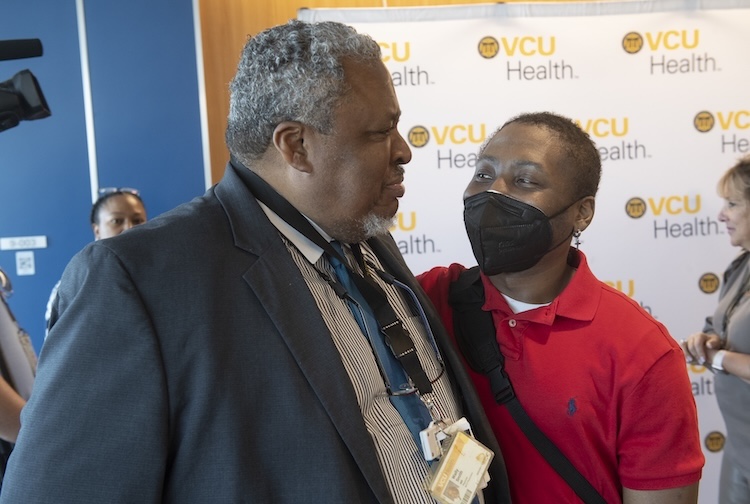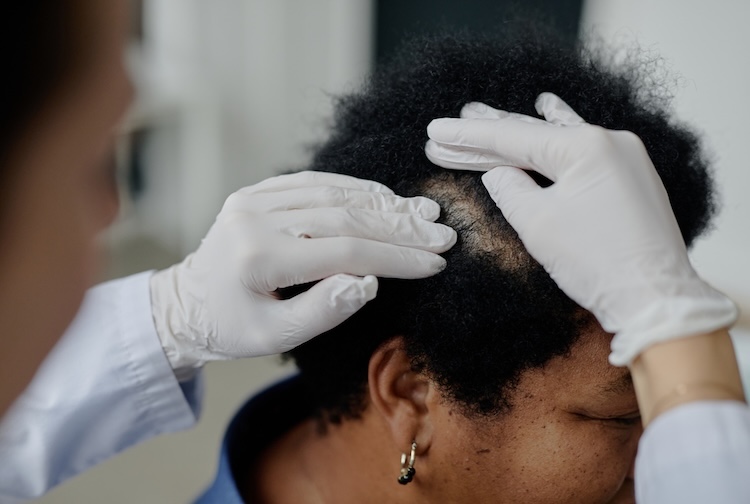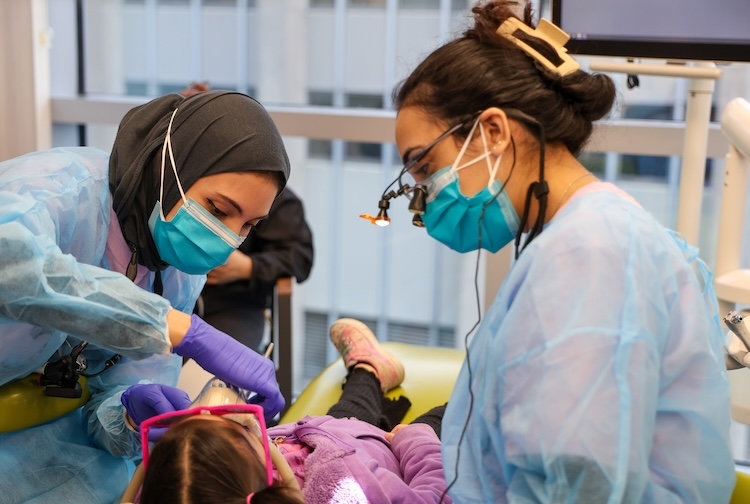How VCU Health is pioneering sickle cell treatment and patient advocacy
From gene therapy to holistic care, VCU Health’s director of the Adult Sickle Cell Disease program details their team’s groundbreaking work to transform patients’ lives.
September 10, 2025.jpg) Members of VCU Health’s adult and pediatric sickle cell programs with patient Walter Davis, who participated in the gene therapy clinical trial. (From left to right: Mica Ferlis, ACNP, India Sisler, M.D., VCU Health patient Walter Davis, Thokozeni Lipato, M.D., Wally Smith, M.D., and Shirley Johnson, LSW) (Tom Kojcsich, Enterprise Marketing and Communications)
Members of VCU Health’s adult and pediatric sickle cell programs with patient Walter Davis, who participated in the gene therapy clinical trial. (From left to right: Mica Ferlis, ACNP, India Sisler, M.D., VCU Health patient Walter Davis, Thokozeni Lipato, M.D., Wally Smith, M.D., and Shirley Johnson, LSW) (Tom Kojcsich, Enterprise Marketing and Communications)
By Danielle Pierce
Imagine waking up with so much pain that you debate getting out of bed. It’s difficult to get started with your morning routine when there is so much uncertainty to get through each day living with a debilitating medical condition – sickle cell disease.
The genetic blood disorder is a painful, lifelong condition that affects thousands of Virginians, many of whom face limited treatment options and barriers to access care. But at VCU Health, a new chapter is unfolding – offering hope to patients living with the disease. VCU Medical Center is currently the only qualified center in Virginia offering gene therapy for sickle cell, a groundbreaking approach that could transform lives.
To learn more about the Adult Sickle Cell Disease program’s current efforts, VCU Health News spoke with the program’s director, Wally Smith, M.D., who has dedicated his 40-year-long career to caring for patients with this condition, shares why the future of sickle cell care is brighter than ever.
What is sickle cell disease?
Sickle cell is the most common inherited blood disorder. It causes red blood cells to become rigid and shaped like crescents or sickles, limiting their ability to carry oxygen and causing blockages in blood vessels that lead to severe pain, organ damage and other serious complications. In the United States, sickle cell disease is often diagnosed at birth through routine blood screenings for newborns.
VCU Medical Center is the only qualified hospital in Virginia offering gene therapy for sickle cell disease. What is the latest with this treatment option?
It is a major milestone for our team to offer gene therapy for sickle cell disease. We have been part of the clinical trial for Lyfgenia (Bluebird Bio) since 2021. Our first patient to receive the gene therapy, Walter Davis, is doing very well after treatment.
Right now, we’re actively preparing our staff to manage patients who are candidates for gene therapy and transplantation. The process is rigorous. It starts with hundreds of inquiries and referrals to our department. This list gets substantially narrowed down to a few who are ready to commit to a year-long journey involving chemotherapy, cell collection and infusion. We’ve built new referral pathways to both pediatric and adult transplant teams to support this effort.

Walter Davis (right) is a longtime patient of Wally Smith’s at the VCU Health Adult Sickle Cell Disease program. (Tom Kojcsich, Enterprise Marketing and Communications)
Since the Federal Food and Drug Administration approved gene therapies like Casgevy and Lyfgenia in 2024, fewer than 20 patients worldwide have received them. We have several patients in the pipeline, navigating insurance approvals and scheduling cell collections with our partner companies.
What treatment options are currently available for sickle cell patients?
Other than the gene therapies Casgevy and Lyfgenia, there are three FDA-approved medications for sickle cell treatment:
- Hydroxyurea is considered the standard of care and has been publicly available since 2008.
- L-glutamine and Crizanlizumab were approved in 2017 and 2019, respectively, are effective and can be used in combination, though they haven’t yet reached “standard of care” status.
How does VCU Health support patients beyond medical treatment?
Our Adult Sickle Cell Medical Home, established in 2018, provides comprehensive care, including medical, social and psychological support. We’re available around the clock, and our holistic approach to patient care ensures that we address not just physical symptoms but also the emotional and social impacts of living with a lifelong disease.
What does the future look like for sickle cell care and treatment?
We’re incredibly excited about the clinical trials we’re currently participating in. VCU Health is involved in pioneering national research, including trials for emerging drugs, gene editing and stem-cell treatments. While we can’t share all the details yet, the early results are promising, and we look forward to sharing more soon.
Aside from the clinical trials, what are you and your team most excited about right now?
September is Sickle Cell Awareness Month, and we’re hosting our third annual Career Transition Fair. This event supports young adults with sickle cell disease as they navigate education and employment challenges. We have great community partners who are committed to helping these young adults thrive. This is another great example of how we support the whole patient from bedside to home – even their workplace.
We’re also deeply committed to advocacy — working with other centers and patient groups across Virginia to push for greater legislative awareness and action.

This September marks the third year that VCU Health's Sickle Cell Disease program has coordinated a career fair for patients. (Tom Kojcsich, Enterprise Marketing and Communications)




